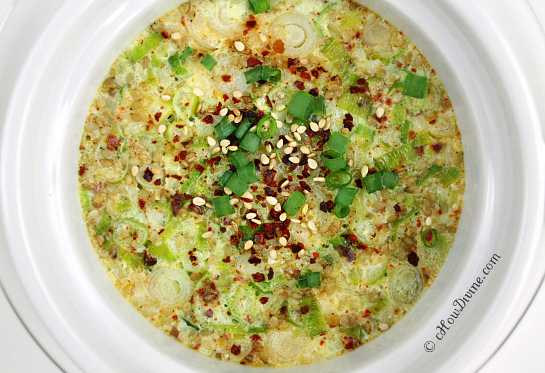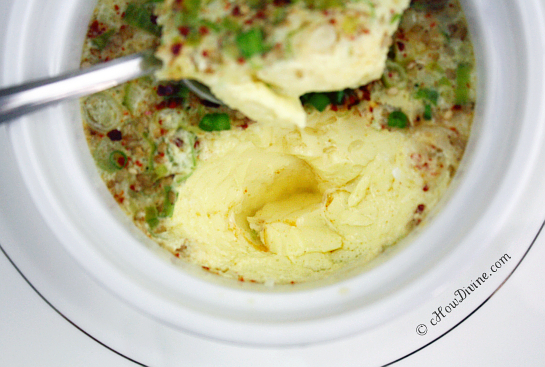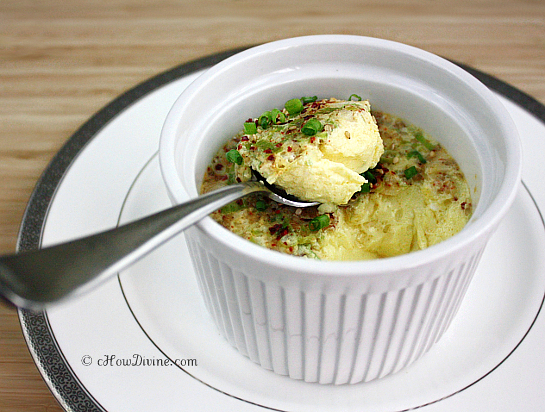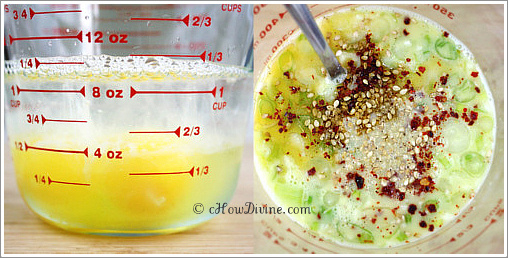Gyeran or Gaeran Jjim (Korean Steamed Eggs) is often served as part of the banchan spread when you go to a Korean restaurant. But you don’t have to visit a Korean restaurant to enjoy this dish. It is one of the easiest dishes you can make at home. Additionally, you don’t have to limit its potential. It can be much more than a side dish. For instance, you can serve it for breakfast or brunch with different stir-ins. And you can serve it in individual ramekins for a fun and lovely presentation.
But Gyeran Jjim is more than just a pretty face. It is unbelievably delicious. I absolutely love Gyeran Jjim for its savory flavor and its heavenly custard/flan-like texture. My mom and paternal grandma used to make it for me all of the time. And I used to gobble up every bit, every single time.
My mom worked a lot when I was growing up. Understandably, she didn’t have much time to cook for us when she arrived home late in the evening. So this dish was perfect for our situation at the time. I remember her making this in the microwave to conserve what little time she had to make us dinner. I steamed mine in a steamer for this post. Either way, it is very easy and absolutely delectable.
Gyeran Jjim (Korean Steamed Silken Eggs) Recipe
Serves 2 people as a side dish
Ingredients
3 eggs, beaten
water (1:1 water:egg ratio)
1 tsp salted shrimp*
1/2 tsp gochugaru (Korean red chili pepper flakes)
1 clove garlic, minced
1 green onion, chopped into thin rings
1 tsp toasted sesame oil
1 tsp crushed toasted sesame seeds
*Note: For a vegetarian version, salted shrimp can be substituted with sea salt. Start with 1/2 -2/3 tsp of sea salt. You can always add more to taste once cooked.
- Directions
- In a pot that would fit a steamer basket/insert, bring about an inch of water to a boil. While the water is heating up, lightly beat the eggs in a bowl. Stir in rest of the ingredients. If you do this in a measuring cup, it will be easier to measure the amount of water necessary. I added 2/3 cup water to the 3 eggs that measured to be 2/3 cup. Mix well until well incorporated. Transfer to a ramekin (or other “steamer-safe” bowl).
- Place the bowl in the steamer basket/insert and lower it into the pot (be careful not to burn yourself!). Steam for 10 minutes covered with tight-fitting lid. Alternatively, you can microwave it for 3-4 minutes – covered. Remove from heat. It will still be jiggly when you give it a light shake. Let stand for a few minutes. It will continue to “cook” in the ramekin for a few minutes even after you remove it from heat. So don’t overcook!
Gyeran Jjim should have a custard/flan-like texture. If it looks spongy, you’ve overcooked it.





Sweet memories! This is one of my fave banchans too that my mom used to make – overcooked and all 🙂 I never figured out the eggs to water ratio so can’t wait to try your recipe. Thanks!!
You are so welcome, Sunny! It’s so nice that food is similar to music in the way they both can conjure up memories from the past. This brings back fond memories for me too. My mom and my grandmother are always in my thoughts whenever I make/eat this dish.
Me too – Mom never measured and I tried and tried with no luck! Can’t wait! Thank you!
You’re welcome Maureen! Funny tho how everything mom made always turned out perfect. 🙂
i grew up eating the basic Chinese steamed eggs with only sesame oil and soy sauce. This Korean style sounds a lot more delicious with all the additional toppings such as dried shrimp and pepper flakes. I can’t wait to try this. Thanks!
It’s perfect for those times when you need a quick meal. You can even make it in the microwave, which should help in this (yet another) heatwave! 🙂
Oh I was wanting this for dinner tonight but couldn’t find a descent recipe. This looks fabulous! Bookmarked!
And it’s so easy to make too! 🙂
If I don’t finish it, can I store it in the fridge and eat it the next day?
Hi Joe, we rarely have any leftovers now; but my family used to do it all the time when I was growing up. It actually tastes pretty good cold w/ some warmed steamed rice if you decide not to reheat it. So you can definitely refrigerate it. You can also make less. Just use the 1:1 egg:water ratio and cut down the amount of seasoning accordingly.
Only concern would be that the egg may get spongy when you reheat it or that the egg might smell “eggy” depending on the quality of the egg. The shrimp paste does go a long way in cutting the “eggy” smell when reheating is necessary tho (if you used it). Hope this helps.